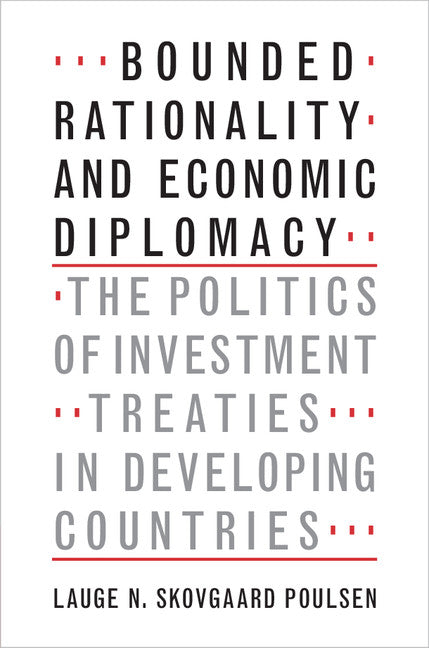Freshly Printed - allow 8 days lead
Couldn't load pickup availability
Bounded Rationality and Economic Diplomacy
The Politics of Investment Treaties in Developing Countries
This book examines how developing countries often sign up to highly potent rules underwriting economic globalisation without even realising it.
Lauge N. Skovgaard Poulsen (Author)
9781107119536, Cambridge University Press
Hardback, published 21 August 2015
264 pages, 15 b/w illus. 15 tables
22.9 x 15.2 x 1.6 cm, 0.52 kg
'All scholars of international politics and perhaps others should read this interesting book. It makes valuable contributions, both specific and general. It develops an original, convincing explanation of the phenomenally rapid spread, especially during the 1990s, of bilateral investment treaties [BITs] involving developing countries, and of the treaties' puzzling content. It also demonstrating an insightful way to check and enrich rational choice analyses of many other political phenomena.' John S. Odell, International Relations
Modern investment treaties give private arbitrators power to determine whether governments should pay compensation to foreign investors for a wide range of sovereign acts. In recent years, particularly developing countries have incurred significant liabilities from investment treaty arbitration, which begs the question why they signed the treaties in the first place. Through a comprehensive and timely analysis, this book shows that governments in developing countries typically overestimated the economic benefits of investment treaties and practically ignored their risks. Rooted in insights on bounded rationality from behavioural psychology and economics, the analysis highlights how policy-makers often relied on inferential shortcuts when assessing the implications of the treaties, which resulted in systematic deviations from fully rational behaviour. This not only sheds new light on one of the most controversial legal regimes underwriting economic globalization but also provides a novel theoretical account of the often irrational, yet predictable, nature of economic diplomacy.
Preface: the curious case of Pakistan
1. Unanticipated consequences
2. Bounded rationality and the spread of investment treaties
3. A difficult beginning
4. Promoting investment treaties
5. A less then rational competition
6. Narcissistic learning
7. Letting down the guard: a case study
8. Expanding the bounds of rationality in the investment regime.
Subject Areas: International economic & trade law [LBBM], International law [LB], Political economy [KCP], International trade [KCLT], International economics [KCL], International relations [JPS], Globalization [JFFS]


